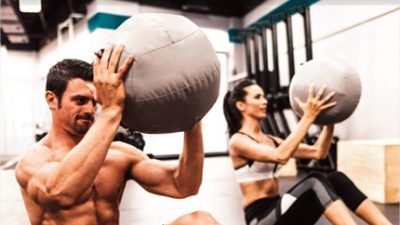Are you feeding your muscles well?

You may be surprised how much diet can affect your muscles, after all, they are what keeps us going all day (and night) so they need a lot of nutrients.
Why is muscle maintenance important?
Muscles support your body in virtually any position and any movement, they stabilise your joints and enable you to perform essential tasks. Stronger muscles also help prevent injuries and can reduce your risk of osteoporosis.
Protein – vital for muscle repair
Muscles suffer lots of micro tears during the day simply as a result of your activity and this damage is being constantly repaired so, for speedy and efficient repair, you need to supply your body with protein.
During digestion, your body breaks protein down into individual amino acids and then uses these to assemble the proteins needed for maintenance. All plants contain protein and all the essential amino acids your body needs. Certain foods contain more than others – pulses (soya, chickpeas, beans and lentils), wholegrains (oats, wholemeal bread and pasta, quinoa), nuts and seeds, for example, but all plant-based foods have some protein, unless they are extracts, such as oil or sugar.
It’s not difficult to get enough protein from everyday foods alone. A regular, moderately active person doesn’t need to worry about their protein intake if each meal contains one the foods listed above – that’s how easy it is. Only if you specifically want to gain muscle, you should increase your intake.
Consuming protein evenly throughout the day, rather than having a large protein dose in one meal, is better because that way your muscles have a steady supply of amino acids to work with.
Carbohydrates – the main fuel
Our bodies are built to use carbohydrates as the main source of energy. When carbohydrates are digested, they release glucose – sugar – into the bloodstream and glucose is the primary fuel needed by every single cell in your body.
Your muscles store glucose in a special form called glycogen – an energy reserve used during exercise or prolonged physical activity. For your muscles to be at their best, they need a good supply of healthy carbohydrates to fuel their activity and to replenish their energy stores. The best sources include wholegrains, starchy vegetables (sweet potatoes, root vegetables, squashes and pumpkins, peas and corn) and fruit, both fresh and dried.
Omega-3 fats – muscle care
There’s some evidence that omega-3s can improve muscle function and support muscle gain. Because they’re anti-inflammatory and also supply building material to cell membranes, they can aid faster muscle recovery. The best sources are flaxseed, chia seeds and hemp seeds, walnuts and rapeseed oil. You can also opt for a supplement made from microalgae.
Magnesium – cramp prevention
Magnesium is essential for muscle function and if you’re running low, you may experience muscle cramps because magnesium helps muscles to relax. Luckily, a healthy vegan diet is rich in magnesium, with the best sources being green leafy vegetables, nuts, seeds, oats, whole wheat pasta, brown rice, pulses, bananas, apricots, apples, prunes and cocoa powder.
Calcium – muscle signalling
You probably associate calcium with bones and teeth and you’re right but it’s also important for muscles. They contract thanks to calcium molecules and nerve signal transmission also requires calcium. Among the best plant sources are green leafy veggies (kale, broccoli, spring greens), sesame seeds and tahini, almonds, chia seeds, tofu (made with calcium salts), tempeh, beans, dried figs, plant-based milks fortified with calcium, fortified vegan breakfast cereals, wholemeal bread and even butternut squash.
B Vitamins – energy converters
When it comes to muscle performance, B vitamins play a big role as your body needs them to convert nutrients into energy and they are essential for the manufacture of red blood cells that carry oxygen to your muscles.
You should be able to get enough of all B vitamins, except for B12, from your diet, the best sources being wholegrains, breakfast cereals, wheat germ, nutritional yeast, sunflower and sesame seeds (including tahini), leafy greens, avocadoes, mushrooms, corn, nuts, pulses and acorn squash.
For vitamin B12 you need a supplement to achieve an adequate intake. Aim for at least 50 micrograms daily or 2,000 micrograms weekly, although a daily supplement is better.
Vitamin D – essential maintenance
Vitamin D is important for healthy muscle function and its deficiency can lead to the loss of muscle mass and impaired muscle metabolism. Our main supply of vitamin D comes from sunlight acting on our skin and regardless of diet, we all need to supplement vitamin D as our skin simply cannot make enough from about October to April. During warmer months, your skin can probably make sufficient vitamin D when exposed to natural sunlight, unless you spend your days indoors or always protect your skin. The recommended daily dose is 10 micrograms or 400 IU (international units).
How vegan diets improve muscle function
A healthy vegan diet is not only great for your general health, it also improves how your muscles work. When you eat plant foods that are naturally low in saturated fats and high in antioxidants and fibre, your blood vessels are healthier. They contract and relax better and faster and regulate blood flow more precisely. The natural nitrates from vegetables slightly widen your blood vessels, which allows more blood to flow into your muscles and that leads to a better exchange of oxygen and nutrients between the blood and muscle tissue.
Importantly, wholesome vegan diets lower the levels of inflammation in the body – important for muscle recovery. Micro damage that happens naturally in muscles when you’re physically active triggers small inflammatory reactions and a plant-based diet, with its antioxidants, phenols, polyunsaturated fats and fibre, lowers these inflammatory reactions, limits damage and helps a faster recovery.
Beyond diet
Muscles need stimulation to be at their best but you don’t need to lift weights, just engage in some type of daily physical activity. As we age, we’re more prone to losing muscle mass but it’s not inevitable – exercise or an active lifestyle can keep your muscles in good shape and is excellent for bone health, too.


